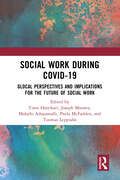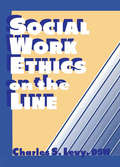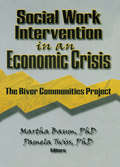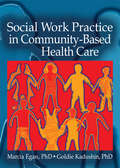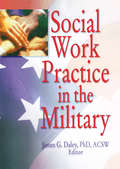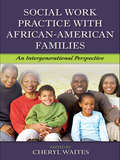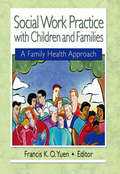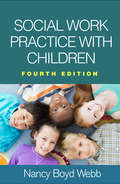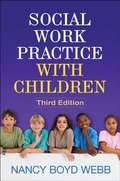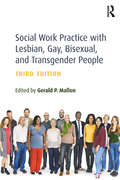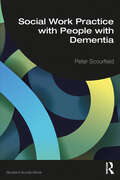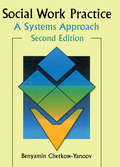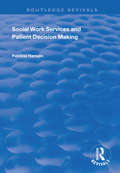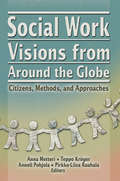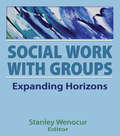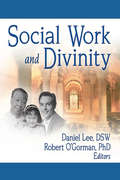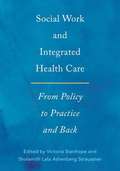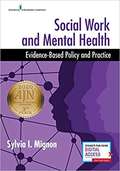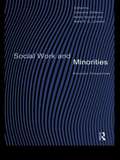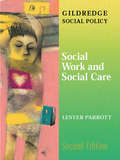- Table View
- List View
Social Work During COVID-19: Glocal Perspectives and Implications for the Future of Social Work
by Timo Harrikari Joseph Mooney Malathi Adusumalli Paula McFadden Tuomas LeppiahoThis book focusses on social work in the time of COVID-19. Social workers, their clients, and the organisations they represent have been affected by the pandemic in multiple ways. The pandemic and various efforts to curb the viral outbreak, such as face masks and lockdowns, have forced social workers to adapt to a ‘new normal’, launch new practices, mobilise social support and networks remotely, and above all, defend the most vulnerable populations. This requires an understanding of how social work and its clients are prepared for, capable to respond to, and further, to recover from a societal crisis and human disasters, like a coronavirus pandemic. Divided into three parts, it provides a wealth of knowledge related to social work in different local and cultural contexts during the period of the global pandemic. With experienced social work researchers across a diversity of settings, contexts, and research traditions, the book is reflective of the ‘glocal’ response of social work. Offering new perspectives on challenges social workers have faced in dealing with the pandemic, it makes critical and timely insights into the innovations and adaptations in social work responses, with a strong empirical basis. It will be of interest to all social work scholars, students, and practitioners.
Social Work Ethics on the Line
by Simon Slavin Charles S LevySocial Work Ethics on the Line discusses social work ethics in-depth and the process of making ethical judgements in social work practice. This much-needed book guides social workers through ethical dilemmas and assists them in their exercise of professional discretion without exclusive reliance on the codes of professional ethics to which they are committed. The author proposes a method to lead social workers through making ethical decisions which enables them to evaluate decisions in actual practice and in the adjudication of grievances and complaints of unethical conduct. This method is fully demonstrated in twenty-four vignettes representing situations commonly encountered by social workers in a variety of professional and educational situations. Raising the ethical consciousness of social work practitioners, trainees, and students, this book helps them develop the awareness and skills necessary for choosing ethical actions in their work. Social Work Ethics on the Line is an invaluable guide for social work practitioners, supervisors, administrators, and community organization workers. It is also helpful for in-service training in social agencies and undergraduate and graduate schools of social work.
Social Work Health and Mental Health: Practice, Research and Programs
by Steven P. SegalRise to today’s challenges with these innovative and helpful value-based solutions!Containing important, research-based insights into social work practice in these fields, Social Work Health and Mental Health Practice, Research and Programs provides unique perspectives on shared practice problems from around the world, offering new solutions to the dilemmas practitioners face every day, such as reduced reliance in inpatient/residential service provision, increased reliance on economics in the era of managed care, the move toward multidisciplinary service provision, the growing awareness of diversity of needs, and the cultural requirements of providing effective services.Social Work Health and Mental Health Practice, Research and Programs provides unique international perspectives on real-world social work practice issues, including: ways to use your social work skills to solicit organ/tissue donation for transplants how a social work directed community organization affected change in health behaviors in East Harlem, New York a look at how to promote psychosocial well-being following a diagnosis of cancer a survey of what mental health services Hong Kong elderly feel they need and what they now receive an examination of the role of demographics and social support in clinician- and patient-related compliance among HIV/AIDS patients a discussion of the appropriateness of hospice services for non-English speaking patients and much more!
Social Work Intervention in an Economic Crisis: The River Communities Project
by Martha Baum Pamela TwissWith the collapse of the steel industry in the 1980s, economic devastation hit the Pittsburgh, Pennsylvania, region. Social Work Intervention in an Economic Crisis strives to deepen understanding of the impact of the economic tragedy in the Pittsburgh region and to present social workers’efforts to enhance recovery. This case study serves as a model for social workers, human service educators and agency personnel, public health professionals, community organizers, policymakers, economic strategists, and researchers in social work, public health, sociology, anthropology, and political science to design and implement human service interventions for similar communities using techniques of action research, community organization, and demonstration projects.Social Work Intervention in an Economic Crisis shows readers relatively simple and highly effective ways of assessing the social-economic situation in their given geographical area. This allows professionals to be in touch with their surrounding communities and estimate the clientele to be served, their particular needs, and their abilities to access services. Chapters in Social Work Intervention in an Economic Crisis describe the responses of local institutions; the roles of informal and formal support networks; and the economic devastation inflicted upon individuals, households, and whole communities. To this end, Hide Yamatani, Lambert Maguire, Robin K. Rogers, and Mary Lou O’Kennedy take the socioeconomic “pulse” of six communities, launching a longitudinal monitoring effort that can be replicated elsewhere for long-range planning and intervention; Martha Baum, Barbara K. Shore, and Kathy Fleissner address the special problems women face; Mary Page and Myrna Silverman focus upon the elderly and their families; Phyllis D. Coontz, Judith A. Martin, and Edward W. Sites look at fathers facing altered childrearing; and Lambert Maguire and Hide Yamatani discuss youth facing altered economic opportunities. With this knowledge in hand, readers acquire skills for: using action research to assess how economic tragedy affects people’s lives mobilizing appropriate actors to engage in intervention learning from community groups and leaders about their concerns to work with them rather than for them recognizing the properties of community cohesion versus fragmentation as they affect efforts of renewal identifying individuals and families suffering most under economic devastation realizing the limits of micro-level intervention generating macro policies at the state and federal levels disseminating findings from action research and intervention/demonstration efforts Finally, Social Work Intervention in an Economic Crisis offers proposals for new societal mechanisms that might reduce the impact of future recessions. The findings and policy proposals set forth in this book help households and institutions deal with the effects of economic change which continue to afflict many families and small communities in the 1990s.
Social Work Leadership in Healthcare: Director's Perspectives
by Gary Rosenberg Andrew WeissmanIn this insightful book, a broad group of social work managers discusses what makes an effective social work administrator. The contributing authors describe their work and work environment, detailing what qualities and traits are needed--within themselves, their co-workers, and their organizations--to be effective and successful now and in the future. Social Work Leadership in Healthcare provides models readers can follow to help improve the social services functions in their own healthcare organizations.The contributing authors discuss issues applicable to the numerous and evolving healthcare issues in urban, center-city, suburban, and rural communities. They provide a stimulating and exciting group of ideas useful to social workers struggling with the same issues in their day-to-day practice. The book acts as a challenge for future social work administrators in healthcare organizations to carry on in the bold, innovative, and compassionate tradition they represent. Today, social work services are faced with a transformation of the healthcare milieu. In the move toward managed and capitated care, social work and other departments are being decentralized, and social work directors are assuming programmatic operational positions in the healthcare arena. Social Work Leadership in Healthcare helps current and future social work leaders in healthcare maintain and expand traditional values and practice commitments in this changing world.
Social Work Practice in Community-Based Health Care
by Goldie Kadushin Marcia EganMake sure your practice skills are up-to-date with the changes brought on by managed careAs a result of escalating costs, the focus of health care in the United States has shifted from inpatient, hospital-based care to outpatient care in the community. Social Work Practice in Community-Based Health Care is a comprehensive guide to the knowledge and skills needed to provide effective and efficient practice within a managed-care context that’s focused on a diversified, aging consumer population and high-risk health conditions. This unique book examines the essential elements of community health practice, including logic modeling for planning and evaluation, interdisciplinary collaboration, and the use of technology and telemedicine in social work practice.Social Work Practice in Community-Based Health Care presents practical information for social workers in the wake of the insertion of managed care as a “third party” to the relationship between physicians and their patients, and advances in medical care that are transforming previously acute and life-threatening illnesses to chronic conditions. The book offers a critical analysis of available research and model service delivery innovations, applying evidence-based practice to case studies in a style that’s easily accessible to practitioners, administrators, supervisors, and social work students. The book also includes glossaries at the end of each chapter and appendices that analyze online resources and address cultural background assessment questions.Topics discussed in Social Work Practice in Community-Based Health Care include: the revolution in funding and delivery evolving trends and healthcare needs of the consumer population a conceptual framework for culturally competent practice the nature of social work in ambulatory health a brief history of healthcare social work emerging practice settings the use of new communication technologies in practice methods for evaluating direct practice ethical considerations current community-based programs for culturally diverse and at-risk populations and much moreSocial Work Practice in Community-Based Health Care is an important resource for social work practitioners, academics, and students.
Social Work Practice in Home Health Care
by Ruth Ann Goode-ChresosThrough Social Work Practice in Home Health Care, social workers will discover a unique “how-to” approach to social work practice in home health care agencies. You will find a historical perspective on home health care and clinical interventions to help you improve home health care for your patients. A wide range of clients, such as the developmentally disabled, post-hospitalization patients, the physically disabled and chronically impaired of all ages, the mentally ill, the terminally ill, newborn infants and their mothers, abused older adults, and abused children are in need of appropriate services that lead to positive and helpful results. Through Social Work Practice in Home Health Care, you will discover how to tailor your practice to meet the needs of individual clients and improve their quality of life.Current and comprehensive, Social Work Practice in Home Health Care provides you with successful methods and suggestions to find resources that clients need in order to face certain life challenges, such as abuse, neglect, poverty, malnutrition, uninhabitable housing, dysfunctional family situations, sensory deprivation, isolation, caregiver stresses, and alcohol and drug abuse. This unique book offers you techniques that can be used with any client base, including: learning from the successes and failures of others through case studies of twelve home health care agencies understanding problem areas of home health care and how clinical interventions can be used to help you make a difference in challenging situations analyzing staffing trends and clinical patient care policies regarding social work services to better assist individuals and their families in identifying, resolving, or minimizing the problems that often accompany an illness screening your clients who are in need of social work interventions, such as individuals suffering from depression over an amputation or debilitating heart attack implementing educational programs that provide systemic knowledge about medicare to improve your services to the elderlySocial Work Practice in Home Health Care provides you with insightful information on everything from staffing, recruiting, and training home health care workers to obstacles that you may encounter, such as the lack of knowledge about social workers among physicians and the public, to help you provide better services to your clients. You will discover how to improve your skills in psychosocial assessment, counseling and decision making, discharge planning, community resources, and supervision to help you adjust your practice and offer positive and effective suggestions to each individual client.
Social Work Practice in the Military
by Carlton Munson James G DaleySocial Work Practice in the Military provides military social workers, military scholars, and civilian social workers with an overview of diverse practice settings as well as the history and future of military social work practice to give you an understanding of the military persona as an ethnic identity. This unique book provides in-depth coverage of issues such as family violence, substance abuse, medical social work, combat settings, ethical dilemmas, managed care's impact on the military, and much more. Social Work Practice in the Military is an essential guide for anyone working with military clients, families of military personnel, or near a military installation. This valuable book contains input from top current and past leaders within the ranks of military social workers to bring you a wide spectrum of firsthand ideas and input to help you better assist your military clients.Social Work Practice in the Military will help you better understand the diversity of social work practice within the military and the many unique situations a military social worker must face. This informative book will provide you with specific ways of improving the lives of your military clients and their families, such as: understanding how the most rapidly expanding arena of practice, family advocacy, which includes a broad array of family violence prevention and intervention services, can help military clients learning how TRICARE, the military managed health care program, impacts military families and social workers in order to provide your clients with the best care while working within the limited budget of a managed care program analyzing the historical discussions of the changing view of substance abuse treatment within the military and how you can best provide effective, multilevel services to your clients examining the extensive involvement of military social workers in a myriad of medical social work programs serving patients and families to help you offer the best patient care in situations involving domestic violence and drug abuse discovering essential skills for military social workers, such as, effective involvement in combat or deployed situations Through Social Work Practice in the Military, you will better understand the importance of your many roles as clinician, advocate, policymaker, resource liaison, and organizational consultant and learn how to successfully accomplish every one of these roles. Containing insight into the future directions of practice, this valuable book will help you effectively assist military clients and their families with the various challenges they face.
Social Work Practice with African American Families: An Intergenerational Perspective
by Cheryl WaitesBe more effective by understanding African American families from an intergenerational perspective Social workers looking to provide competent practice with African American families may be more effective by using a new strengths-based approach from an intergenerational perspective. Social Work Practice with African American Families presents a comprehensive look at this new approach to view, assess, and provide services to multigenerational families and communities. It closely examines this useful innovative framework which encourages opportunities for action to create solutions for survival and change. The approach dynamically considers the changing demographics in American society, key issues, and the various challenges pertinent to the African American community. This text offers a strong, culturally competent approach to social work practice for African American families that takes into consideration the latest policies, programs, and demographic changes. It also incorporates the voices of African American families, along with teaching that focuses on strengths derived from the transfer of information and support between multiple generations. The book is extensively referenced and provides tables to clearly present data. Topics discussed include: the importance of strong kinship bonds demographic changes mutually supportive intergenerational relationships intergenerational policy intergenerational programs cultural genograms assessment issues long term care giving issues intergenerational influences on education the role of intergenerational knowledge transfer in church community programming and much more! Social Work Practice with African American Families is a valuable resource for social workers, counselors, educators, and students in African American studies and family studies.
Social Work Practice with Children and Families: A Family Health Approach
by Francis K. YuenEffectively engage clients in working for personal changeSocial Work Practice with Children and Families presents the framework for family health social work and its applications in various practice environments. This vital textbook provides a unique blend of academic deliberations and practical service guidelines. Case examples or discussion questions are included at the end of each chapter to facilitate more in-depth understanding and discussion among graduate and undergraduate students, professors, and educators in health and human service areas.Social Work Practice with Children and Families is organized into two major sections entitled "Practice Interventions" and "Policy, Programs, and Emerging Families." This book will supply you with intervention and change strategies for promoting the physical, mental, emotional, social, economic, cultural, and spiritual growth and development of the family unit and each of its members, resulting in its holistic well-being. The book covers a wide variety of family dynamics that you will encounter, including gay/lesbian parents, single parents, and grandparents as caregivers. In this resource, you will also find case studies, adaptive strategies, and intervention models for working with families dealing with: abuse and violence disability loss and grief HIV/AIDS migrating and seasonal farm work and more!Social Work Practice with Children and Families will show you how to adopt and use family health social work practice methodology and models in your casework. As a supplemental text, it will help you harness the resources of the household, the government, and the community to develop interventions and services that promote the interests and welfare of your clients and their loved ones.
Social Work Practice with Children, Fourth Edition: A Handbook For Practitioners (Clinical Practice with Children, Adolescents, and Families)
by Nancy Boyd Webb Luis H. ZayasA leading course text and practitioner resource for over 20 years--now revised and updated--this book presents developmentally and culturally informed methods for helping children in family, school, and community settings. Nancy Boyd Webb offers vital guidance and tools for practitioners. The text demonstrates research-based strategies for working with victims of maltreatment and trauma as well as children affected by poverty, parental substance abuse, bullying, and other adversities. Vivid case examples illustrate the "whys" and "how-tos" of play and family therapy, group work, and school-based interventions. Student-friendly features include thought-provoking discussion questions and role-play exercises. Reproducible assessment forms can be downloaded and printed in a convenient 8 1/2" x 11" size. New to This Edition *Chapter on working with immigrant and refugee children. *Coverage of additional evidence-based practices for intervening with kids. *Discussion of therapist self-care. *Coverage of working with gender-nonconforming children. *Updated for DSM-5, and features up-to-date research on brain development, trauma, and more.
Social Work Practice with Children, Third Edition
by James W. Drisko Nancy Boyd WebbWidely adopted, this bestselling work provides the knowledge that social workers need for effective, culturally competent practice with children, adolescents, and their caregivers. The author presents a framework for developmentally informed assessment and intervention and describes a variety of powerful helping methods, illustrated with vivid case examples. Demonstrated are research-based strategies for working with victims of abuse and trauma as well as children affected by poverty, divorce, parental substance abuse, and other adverse circumstances. Special features include instructive discussion questions and role-play exercises. Reproducible assessment forms can also be downloaded and printed in a convenient 8 1/2" x 11" size. New to This Edition Updated to incorporate current research on child development, attachment, and trauma. Chapter on bullying. New discussions of autism, childhood obesity, and blended families. School social work chapter has been extensively revised. Expanded examples of group work, including groups for children with ADHD and crisis groups following disasters.
Social Work Practice with Lesbian, Gay, Bisexual, and Transgender People
by Gerald P. MallonAlthough the vast majority of LGBT persons are healthy, resilient, and hardy individuals who do not seek social work intervention, some have been or will be clients in social work agencies. The third edition of Social Work Practice with Lesbian, Gay, Bisexual, and Transgender People updates this classic text and expands its scope to include new content on social work with older and younger LGBT people. Written by a team of highly experienced experts, this book provides a knowledge base for practice that will better prepare students and practitioners for working sensitively, competently, and effectively with LGBT individuals and groups. Comprehensive and practical, this unique text discusses the pragmatic aspects of social work with lesbian, gay, bisexual, and transgender people. It will improve and reinforce competent practice with LGBT persons and their families in multiple settings. Chapters focus on important topics such as: the profession’s core values and ethical principles; social work and queer theory; LGBT and race—heterosexism, racism, and sexism; applying the life model and the stress-coping process; practice with bisexual, transgender, and gender non-conforming persons; relationship building between lesbian partners; the impact of creating family for lesbian couples; internalized homophobia, heterocentrism, and gay identity; group work practice with the LGBTQ community; clinical assessment for families where sexual orientation is an issue; and LGBT parenting. There are also new chapters on social work with LGBT young people and LGBT older people. Complete with a highly detailed appendix of symbols, definitions, and terms, Social Work Practice with Lesbian, Gay, Bisexual, and Transgender People, third edition is an invaluable resource for social workers and mental health professionals as well as for students and educators at all levels of experience.
Social Work Practice with People with Dementia (Student Social Work)
by Peter ScourfieldSocial Work Practice with People with Dementia critically discusses the cultural and discursive contexts in which social work with dementia takes place. This is because how we think about dementia influences how we treat people living with the condition. The book also explains the demographic context that has made dementia a global public health priority in recent years. The different forms of dementia are discussed in a way that is accessible to a non-medical readership. The book discusses the different settings and circumstances in which social work with people with dementia and their carers takes place and examines the chief elements of the social work role. In doing this, it explains the professional knowledge, skills and values that social workers need in order to practice effectively in this area of growing importance. Part of this is appreciating how approaches to dementia care have evolved over time. In this context, the book discusses how the dominant bio-medical model has been challenged by person-centred and rights-based approaches. As a key part of social work is to offer people choices, the book provides information about a wide range of health, social care and other services that are available, whilst also highlighting the gaps that exist for different groups and in different areas. Case studies and activities help the reader apply theory to practice. Social Work Practice with People with Dementia will be of particular interest to social work students and early career social workers, primarily in a UK context. However, it contains much relevant information about dementia and dementia practice for anyone involved with adult health and social care both in the UK and around the world.
Social Work Practice: A Systems Approach, Second Edition
by B Harold Chetkow-YanoovReplete with numerous diagrams, charts, tables, and exercises, the second edition of Social Work Practice: A Systems Approach brings alive the systems model of social work practice. Learning systems analysis will lead you to a more dynamic view of reality. With this book as a guide, you are sure to give your social work practice the overhaul it needs. This user-friendly text will allow you to integrate micro and macro modes of intervention, sensitize your practice, enhance your conflict resolution skills, and analyze system-environment structures and currents.The basis for popular ecological models in current social work literature, the systems model can be used to understand social change, to plan or direct social change, and to analyze environmental impacts on human growth and behavior. As Social Work Practice: A Systems Approach explains, the systems model is appropriate for international social work because it is applicable across cultural and societal boundaries. This book provides you with specific system-based intervention steps, descriptions of problem situations, and an understanding of practice theory for your social work practice. A key resource for educators, students, and practitioners, it discusses:creating an effective network of social servicesthe implications of ecological theory for social work practiceeco-mappingsystems-oriented concepts in the social sciences and social workthe individual person as a systemmanaging social change and conflict processesgleaning effective strategies from existing practice modelsWith its outline of a one-semester master's level course in systems analysis and its discussion of the 20th-century paradigm shift from reductionism to wholeness, Social Work Practice: A Systems Approach will be a great asset to social workers both within and beyond the classroom. Those in other helping professions, such as education, psychology, and organization development, will also find this book vital to understanding the changes experienced during the last 30 years. You will discover how many systems-based professional social work roles and strategies are compatible with existing models.
Social Work Services and Patient Decision Making (Routledge Revivals)
by Patricia HansenFirst published in 1998, this timely study of an American acute care hospital examines decision making by patients and their families along with a cost analysis of social work services. The first part focuses on the patient’s experience of acute hospital care and the second part examines the factors which influence the use of social work resources in providing services to acute hospital patients. Patients were asked about the treatment and discharge decisions made, the agreements that occurred and the problems they experienced while they were in the hospital and after discharge. Surprisingly, the patients reported little difficulty with the decision making environment although it was evident that many experienced a high level of difficulty once discharged. The second part focuses on the utilization of social work resources for these patients. The study uses an activity based framework to examine the cost drivers for social work intervention. It is the first example of the application of ideas from activity based costing to analysis of social work services in hospital settings. Patricia Hansen’s interviews enable us to listen to the voices of those using social work services and the influences on their decision making, presenting a ground-breaking analysis of social work drivers. The findings question what can truly be achieved in such a brief period of time and Hansen presents several sound suggestions to provide comprehensive and effective psychosocial services for patients and families. Her study serves as a gold standard for future social work research on this issue.
Social Work Theory and Practice with the Terminally Ill
by Joan K ParrySocial Work Theory and Practice with the Terminally Ill, second edition, takes a compassionate look at ways that social workers can help dying people and their families. The social workers who work most effectively with terminally ill patients and their families are the ones who best understand the multifaceted nature of the dying process and its impact on the the patient, the family, and even on the health care professionals who work with patients at the end of life. Dr. Parry--who specializes in dying and bereavement--offers astute observations on the stages of dealing with the diagnosis of a terminal illness and the impending death that patients and their families confront. This updated second edition provides valuable new information on ways that social workers can help those with AIDS and their families, on traumatic death from any cause, and on the grieving processes of parents.Social Work Theory and Practice with the Terminally Ill, second edition, also includes stimulating discussions on: the interdisciplinary health team the grieving process professional burnout how social workers adapt to working with dying patients euthanasia and physician-assisted dying living wills and patients’rightsIn touching case studies, this volume illustrates the particular needs and concerns of the terminally ill and their families--impending losses, financial worries, job concerns, pain, unfinished business, and spiritual needs--and reviews successful interventions used by social workers to help patients and their families work through the dying process.
Social Work Visions from Around the Globe: Citizens, Methods, and Approaches
by Teppo Kröger Pirkko-Liisa Rauhala Anna Metteri Anneli PohjolaIncrease the effectiveness of the services you provide to clientsSocial Work Visions from Around the Globe examines the fundamental principles and dilemmas of social work with people whose health is under threat. This valuable resource was compiled from material presented at the Third International Conference on Social Work in Health and Mental Health in Tampere, Finland. The book explores key issues in social work in health and mental health, from the early historical roots of social work in health to developing a human rights perspective on the lives of men who face capital punishment. Using tables, figures, case studies, and interviews, the text will help you provide holistic, client-based care to children, men, women, and families. Social Work Visions from Around the Globe is divided into two sections: the first half discusses the position of individuals and families as users of health and mental health care services. Specific cases in the book include social work situations for children with disabilities, the mentally ill, the elderly, cancer, and HIV/AIDS. This text includes research and findings on the challenges and solutions faced by social workers in North America, Australia, Europe, Asia, and Africa.In the second half, Social Work Visions from Around the Globe focuses on various approaches to social work in health and mental health that address: the diversity of societies strengthening the voice of the social worker and service user the expertise of service users development of methods family life and childhood in global comparison human rights issues in social work
Social Work With Groups: Expanding Horizons
by Stanley WenocurSocial Work With Groups describes continuity and change in group work. It revisits the theoretical ideas of group work and group work topics of the past decade, focusing on the continuity of group work theory and practice. At the same time it emphasizes the need for change to more effectively work with deal with people in new groups in need--people with AIDS, gangs, persons in grief, and minorities, as well as groups always in need but now with new and additional needs--families, children, adolescents. This book deals with how to meet the needs of existing and emerging populations. It shows a good combination of theory and practice of group work in a variety of settings and using traditional techniques with new groups.Chapters in this book revisit the theoretical ideas of group work such as stages of development and the question of self-determination in groups. The sections of theory are the basis for the more practical emphasis of what today’s group worker is doing and how they are doing it. Social Work With Groups is very practice oriented. As such, anybody who uses groups to help people will find much to read and reflect upon. With its across-the-board appeal, persons new to group work will delight in the practical information, and experienced group workers will find the revisiting of the issues a helpful and refreshing approach. Clinical social workers and faculty with an interest in theory and theoretical approaches to group work will appreciate the theory addressed in the book. Social change oriented practitioners searching for new methods of empowerment among the people will find helpful suggestions in this book for social, political, and grassroots activism.
Social Work and Divinity
by Daniel Lee Robert O'Gorman Frederick L Ahearn JrThe milestone text integrating the disciplines of social work and divinity!In everyday life, spirituality and the practice of effective social work are inseparable. As a result, professionals and social service administrators have in recent years felt a stronger obligation to attend to the spiritual needs of clients. Social Work and Divinity examines the potential of integrating the disciplines of social work with divinity to achieve positive results in practice while answering spiritual concerns. Internationally respected scholars from diverse religious and ethnic backgrounds discuss the academic as well as the practical issues involved in the establishment and growth of dual degree programs. Social Work and Divinity comprehensively explores both the theoretical and the practical foundations of joint professional education and practice for social work and divinity dual degree programs. The book provides suggestions that will guide educators, practitioners, administrators, and students to develop spiritually sensitive approaches to counseling people. Emerging human needs are explored, along with the challenges inherent in the multiple roles a counselor must adopt when developing an interdisciplinary approach. Well-reasoned, insightful, thoroughly referenced, empirically reinforced with tables, this is an essential text sure to become a choice educational reference.Social Work and Divinity discusses: the role of religion and spirituality in clinical social work the challenges for students integrating the curriculums of social work and divinity the collaboration to respond to the broader demands of emerging human needs the empirical evidence advocating the benefits of dual degree programs the challenges for educational institutions adopting dual degree programs in social work and divinity the formation of a professional identity in dual degree training and supervision the issues of teaching about organized religion in social work practical advice on integrating religion and social work the role of faith and spirituality in social work educationSocial Work and Divinity is a milestone textbook for graduate schools of social work and divinity and an essential resource for students and faculty involved in each discipline or in dual degree programs.
Social Work and Integrated Health Care: From Policy to Practice and Back
by Victoria Stanhope Shulamith Lala Ashenberg StraussnerWith nearly 40% of social workers working in the health and behavioral health care sectors, Social Work and Integrated Health Care is designed to help social workers understand the policies that shape the current discussion regarding integrated primary care and behavioral health care and their application to practice. While the future of Patient Protection and Affordable Care Act of 2010 (PPACA) is uncertain at this time, the potential for integrated health care to simultaneously improve health outcomes while reducing costs means that despite the constantly changing health policy landscape, the movement towards an integrated health care system will continue in the future. As these changes occur, there is a great need in the social work field for resources that will give both the context for these changes and translate the policies to day-to-day social work practice. This book provides essential information about the important shifts in the health care field with a focus on health care for vulnerable populations, with a special emphasis on adults with severe mental illnesses and substance abuse disorders. As the title indicates, the book provides a comprehensive discussion not only of critical policy issues, but also their specific implications to evidence-based clinical practice. It covers such areas as background on public funding for health care, the development of behavioral health services in the community, and the passage of mental health parity legislation. The text also includes an overview of integrated health care settings and describes evidence practices that are central to integrated health care such as screening, person-centered care planning, motivational interviewing, and wellness self-management. It is a must-have text for all social work students in MSW programs.
Social Work and Intimate Partner Violence
by Mary AllenIntimate partner violence is now recognised as a serious human rights abuse and increasingly as an important public health problem with severe consequences for women’s physical, mental and sexual health. Therefore, a comprehensive understanding of intimate partner violence is an essential aspect of good-quality social work practice. This is an accessible introduction to the complexities of social work practice with abused women, as well as men. Designed for those new to practice in this area, it outlines and explores some of the key issues from an international perspective, such as the role and responsibilities of a social worker, prevalence rates and research around causes and consequences. It includes chapters on working with women with additional vulnerabilities, working with perpetrators, impacts on physical and mental health, child protection issues, assessment and intervention strategies, and long-term approaches. Social Work and Intimate Partner Violence is an up-to-date book bringing together all the most important information in the area for social workers, and is essential reading for all students and newly qualified professionals.
Social Work and Mental Health: Evidence-Based Policy and Practice
by Sylvia I. MignonClear, comprehensive, and accessible, this textbook presents an overview of the contemporary American mental health system and its impact on clients and social workers. The failure of the system to provide quality care for the mentally ill is explored, including issues and policies that social workers face in accessing mental health care for their clients, while also discussing the ways in which social workers can improve the overall functioning of the system and promote the development and expansion of policy and practice innovations. <p><p> This is the first textbook to examine the lack of understanding of the roots of mental illness, the challenges in classification of mental disorders for social workers, and difficult behavioral manifestations of mental illness. By looking at the flaws and disparities in the provision of mental health services, especially in relation to the criminal justice system and homelessness and mental illness, social work students will be able to apply policy and practice to improve mental health care in their everyday work. A focus on the lived experiences of the mentally ill and their families, along with the experiences of social workers, adds a unique, real-world perspective.
Social Work and Minorities: European Perspectives
by Charlotte Williams R.D. Johnson Mark Haluk SoydanSocial Work and Minorities examines the new challenges presented to Social Workers throughout Europe by the complex problems occasioned by increased migration and settlement and the growing awareness of the specific needs of refugees and asylum seekers. Contributors use illustrative examples from throughout Europe to examine key concepts such as: globalization, assimilation, visibility, multi-culturalism, racism, marginalization and social exclusion. Social Work and Minorities will be an essential resource for social work students, practitioners and educators working with migrant communities throughout Europe.
Social Work and Social Care
by Lester ParrottSocial Work and Social Care has been revised and updated to take into account the profound changes that have occurred in social work over the past two years, in particular the extensive legislative changes to childrens and community care services. A new chapter examines the relevance of social exclusion for social work and continues to affirm the importance of equal opportunities and anti-discriminatory practice within social work. Social Work and Social Care: * outlines the importance of social policy for social work * describes the powerful ideological forces that underpin current practice * considers the future of social work and social care within * altered social and political contexts * covers all main areas of social work * includes a glossary and useful website addresses. This book is essential reading for students approaching the study of social work, social care and social policy and includes the most current research available.
